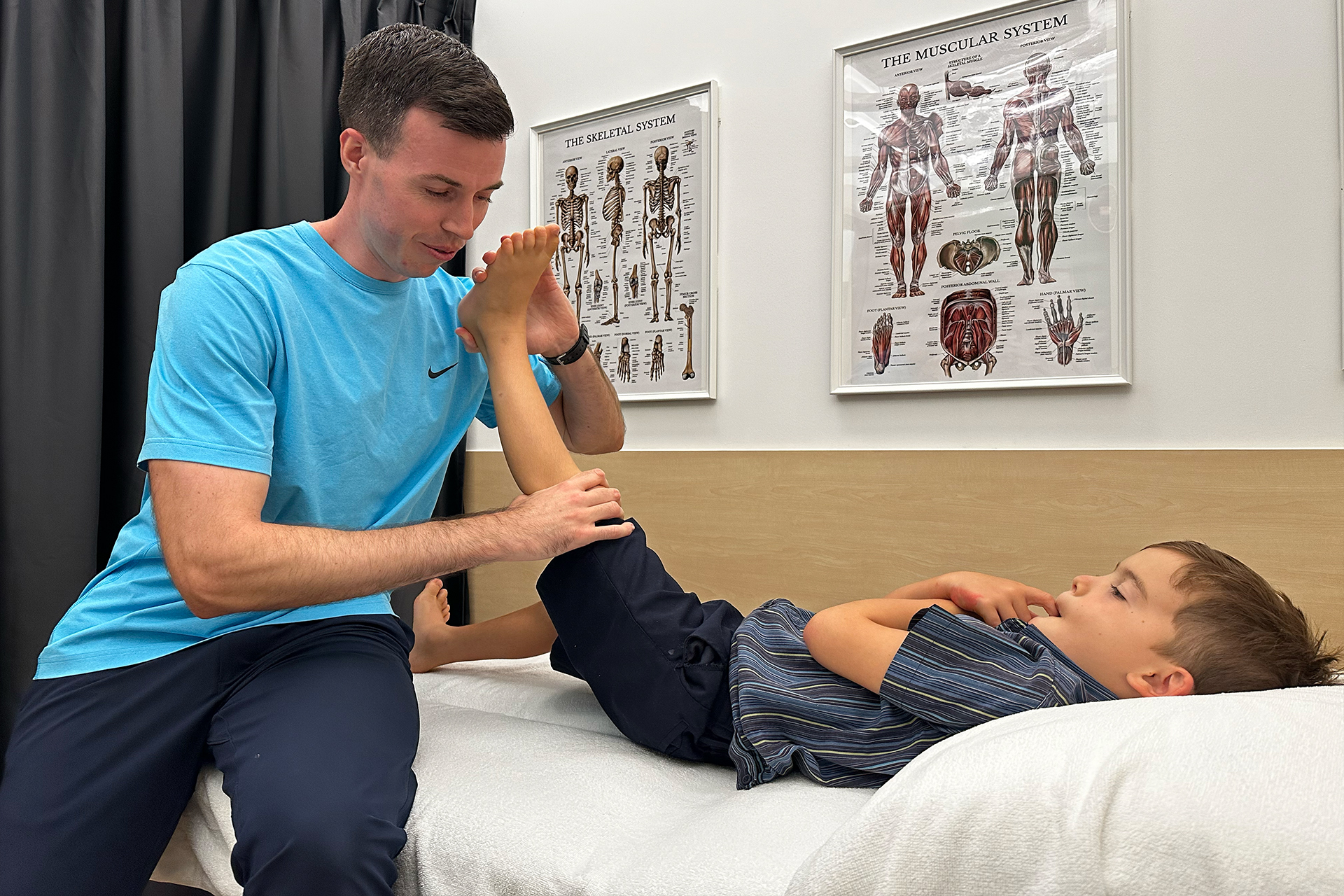What Is Pediatric Physiotherapy?
Pediatric physiotherapy at HelloPhysio offers a comprehensive treatment of children, ranging from the tender age of four to the cusp of young adulthood, who grapple with an array of musculoskeletal disorders. Our pediatric physiotherapists are trained specialists with an immense knowledge of child development and specific childhood conditions. The specialized training helps them to facilitate a care regimen tailored to each child’s distinctive developmental journey and challenges.
At HelloPhysio, our children’s physiotherapy clinic practice is distinct, carried out by a multidisciplinary team skilled in analyzing movement, communicating effectively with parents and caregivers and delivering appropriate treatments to children and young people.
How Does a Pediatric Physiotherapist Treat Children
Pediatric physiotherapists specialize in evaluating and providing guidance, focusing on early interventions when necessary, to help children in positioning, movement and balance — all to help them achieve their fullest physical capabilities.
Pediatrics operates on the principle that children differ from adults, not just in size, but in their developmental stage.
A child’s journey towards maturity requires the cultivation of myriad skills, both interpersonal and societal. Many elements influence this journey, with family and environment playing paramount roles in shaping a child’s physical and mental evolution.
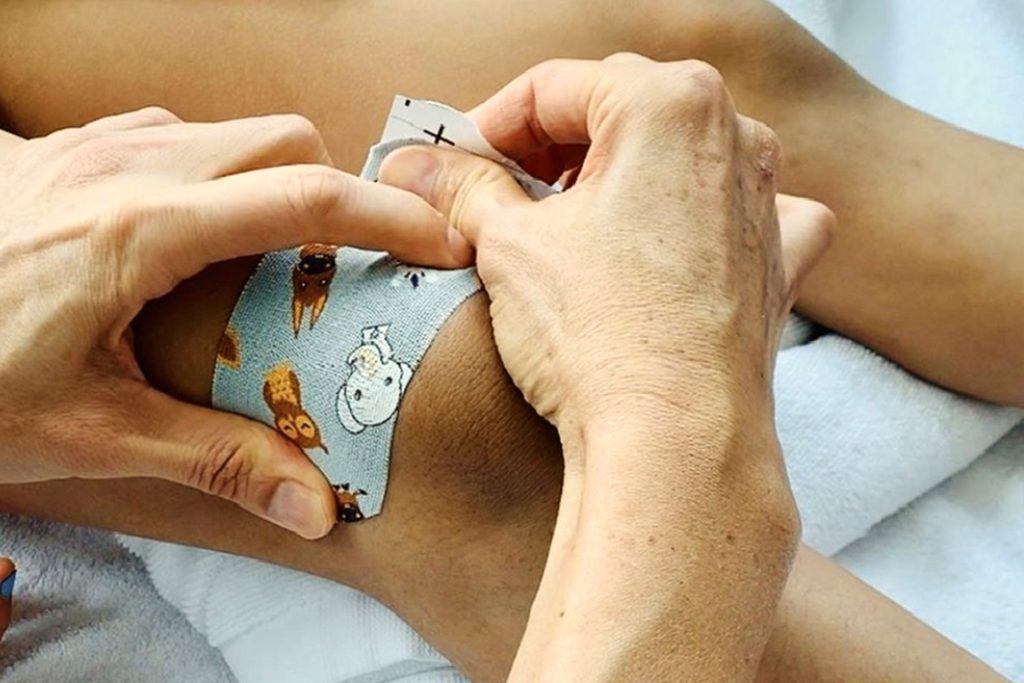
Therapeutic interventions stem from accurately assessing a child’s condition, leading to a personalized treatment plan for our little ones. These programs include clear explanations and guidelines for the child and their parents and other caregivers responsible for their upbringing.
Treating children requires expertise and subtle discernment, allowing our specialists to address each child’s unique needs while grounding their approach in the broader principles of physiotherapy.
Assessment of Pediatric Therapy and Early Intervention
At HelloPhysio, our team conducts thorough assessments of young patients to pinpoint specific therapeutic needs. With a collaborative approach, we engage parents in their child’s physical rehabilitation journey, including a personalized at-home exercise program to achieve optimal outcomes for your child.
Our pediatric physiotherapists design prescribed exercises to improve a child’s muscular foundation, including building strength and preventing tightness, to help facilitate natural movement patterns.
Treatment of Musculoskeletal & Orthopedic Conditions in Children
Pediatric physiotherapists treat many of the same conditions as traditional physiotherapists, yet are distinct due to their focus on children. Pediatrics brings its pathologies, some specific only to this age group. A few of these conditions are identifiable at the very onset of life, while others surface gradually as the child develops.
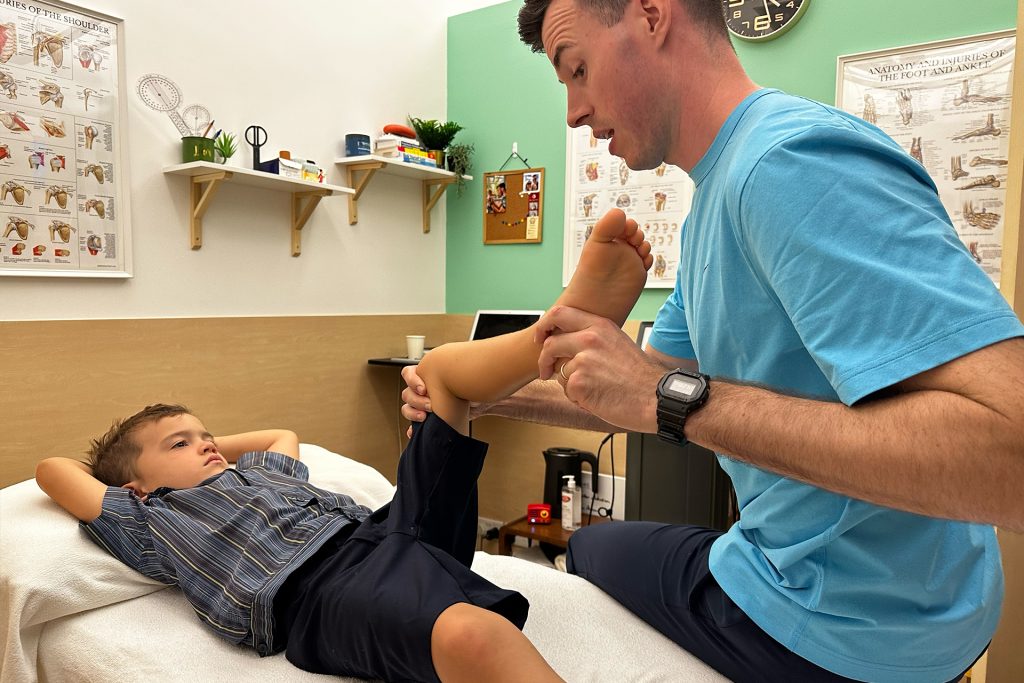
Common musculoskeletal, pediatric physiotherapy conditions treated in our clinic include:
- Acute injuries in children, whether bone fractures or ligament sprains, necessitate a compassionate and meticulous physiotherapy approach, ensuring swift recovery while considering the unique aspects of pediatric healing and growth.
- Dislocations refer to the condition where the bones in a joint are forced out of alignment, often due to trauma or congenital disorders. Unlike subluxations, dislocations involve a complete loss of contact between the bones that make up the joint.
- Flat feet, knock knees, or toe-walking are musculoskeletal conditions in children requiring precise physiotherapy interventions to ensure proper alignment, balanced muscle strength, and natural gait as the child grows.
- Knee ligament injuries vary and require specialized management of the specific condition. For medial collateral ligament (MCL) and medial collateral ligament (MPFL), recovery focuses on strengthening inner thigh muscles and improving patellar tracking, while posterior cruciate ligament (PCL) involves exercises for flexibility, strength and lateral knee stability. Lateral collateral ligament (LCL) recovery emphasizes hamstring and quadriceps strengthening and overall knee stabilization to restore range of motion.
- Pediatric hypermobility, characterized by joints that easily move beyond the expected range, demands targeted physiotherapy to strengthen surrounding muscles, enhancing stability and reducing the risk of injury.
- Subluxations in infants and children refer to the partial dislocation of joints. Pediatric physiotherapy addresses these issues, improving the child’s movement, function and physical abilities.
Pediatric Sports Injuries & Return to Sports Rehabilitation
Acute injuries in children, whether bone fractures or ligament sprains, require a slightly different physiotherapy approach for young patients. Their bodies are still changing and growing, ensuring swift recovery while considering the unique aspects of pediatric healing and growth.
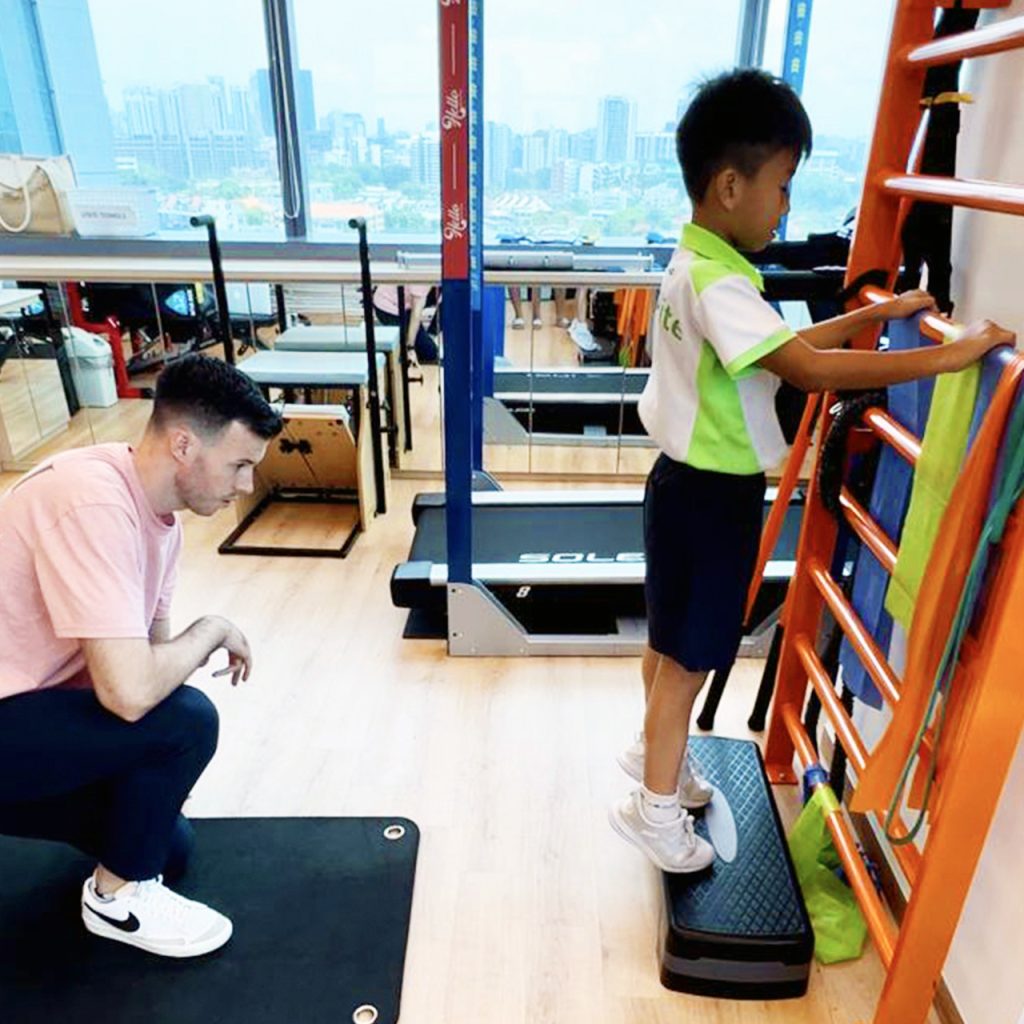
Children, particularly those involved in organized sports or regular physical activities, can be prone to various injuries. The most common sports-related pediatric physiotherapy conditions include:
- ACL tears The anterior cruciate ligament (ACL) in the knee can be injured when an athlete suddenly stops or changes direction. Though more common in adolescents, younger children can also experience this injury.
- Dislocations happen when the end of a bone comes out of its joint. This can occur in contact sports or due to falls.
- Fractures can range from hairline fractures to more severe breaks. Children’s bones can sometimes bend and fracture only part way through, known as ‘greenstick’ fractures.
- Growth plate injuries are unique to children and adolescents. Growth plates are areas of developing cartilage tissue found at the end of long bones. Injuries to these areas can affect bone growth, such as Osgood Schlatter’s or Sever’s diseases.
- Repetitive motion injuries from overuse of particular muscle groups can lead to stress fractures and tendinitis. These are common in sports involving repetitive actions, such as running or swimming.
- Sprains and strains are caused by twisting or pulling muscles or tendons, sometimes through improper stretching or tearing of ligaments.
- Shin splints refer to pain along the shin bone, often seen in runners. It’s caused by inflammation of the muscles, tendons, and bone tissue.
Children need appropriate training, proper gear, and ample rest to prevent these injuries. Regular physical check-ups and consultations with a pediatric physiotherapist can help identify and address potential issues early on.
TESTIMONIAL
I recently took my 8-year-old daughter to HelloPhysio after she injured her shoulder while swimming. Our experience at the clinic was absolutely wonderful, and I couldn’t be happier with the care provided by the physiotherapist, Liam. He did a thorough assessment and took the time to explain each step of the process to my daughter in a way she could understand. Thank you, Liam, and the entire team at HelloPhysio, for taking such great care of my daughter!
– Wang Danqi, mother of patient
Rheumatological Challenges in Children
When we think of joint disorders, it’s tempting to envision them as ailments of the elderly. However, children, too, can face their share of musculoskeletal issues. Among these, rheumatological disorders are significant and often misunderstood.
Juvenile Idiopathic Arthritis (JIA), unlike arthritis that affects adults, encompasses a broader group of conditions and several subtypes of arthritis that affect children, each with distinct characteristics and clinical presentations. The pain, swelling, stiffness and inflammation in the joints the conditions bring can be worrisome to parents as the exact cause of the disease is unclear.
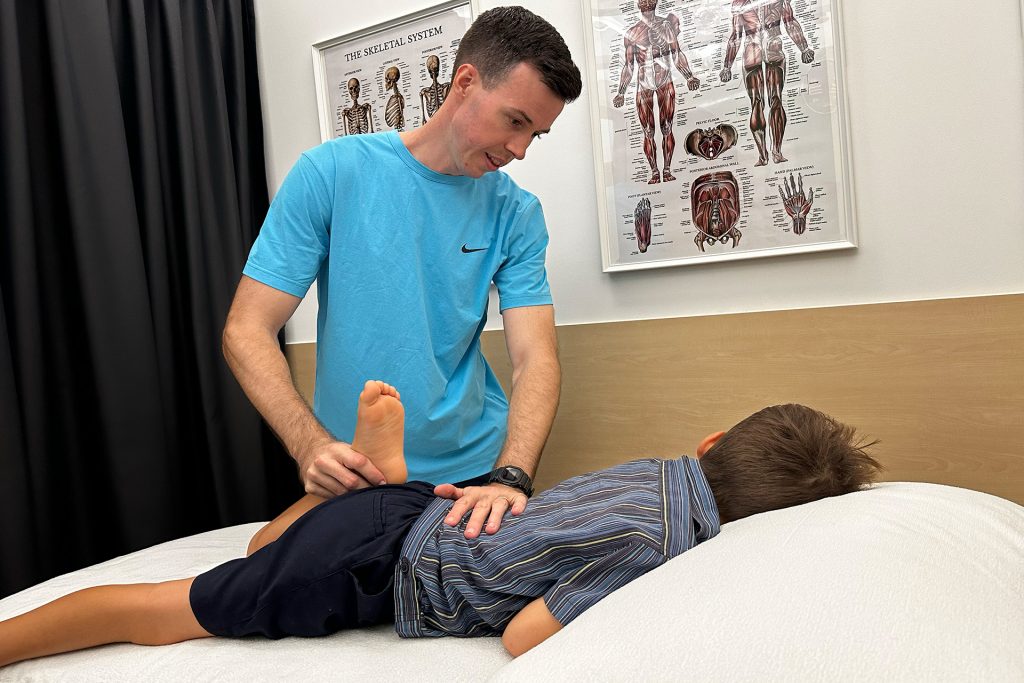
Pediatric physiotherapy is more than just about alleviating the pain in children’s conditions; it’s about ensuring joint flexibility and preserving a child’s capacity to move and play like their peers.
Pre/Post-Operative Physiotherapy
Pediatric post-operative physiotherapy occupies a crucial space in the continuum of care for children who have undergone surgical procedures; regardless of whether surgery was planned or the result of an emergency, subsequent physiotherapy plays a pivotal role in ensuring a swift, safe, and comprehensive recovery.
Children are not merely mini-adults. Their bodies are growing, and their cognitive understanding of pain, discomfort, and the need for rehabilitation might differ from that of older individuals. This requires the physiotherapist to employ unique skills, marrying medical expertise with a keen understanding of pediatric psychology.
Post-operative physiotherapy for children has several core objectives.
Initially, the focus is on alleviating post-surgical pain, swelling and discomfort. This can include gentle mobilization, positioning, and sometimes even basic play activities that serve a dual purpose. As the child progresses, strength training becomes essential, targeting muscles that may have weakened due to surgical immobility.
Enhancing respiratory function is key to ensuring efficient lung operations and preventing complications for children undergoing thoracic or abdominal surgeries.
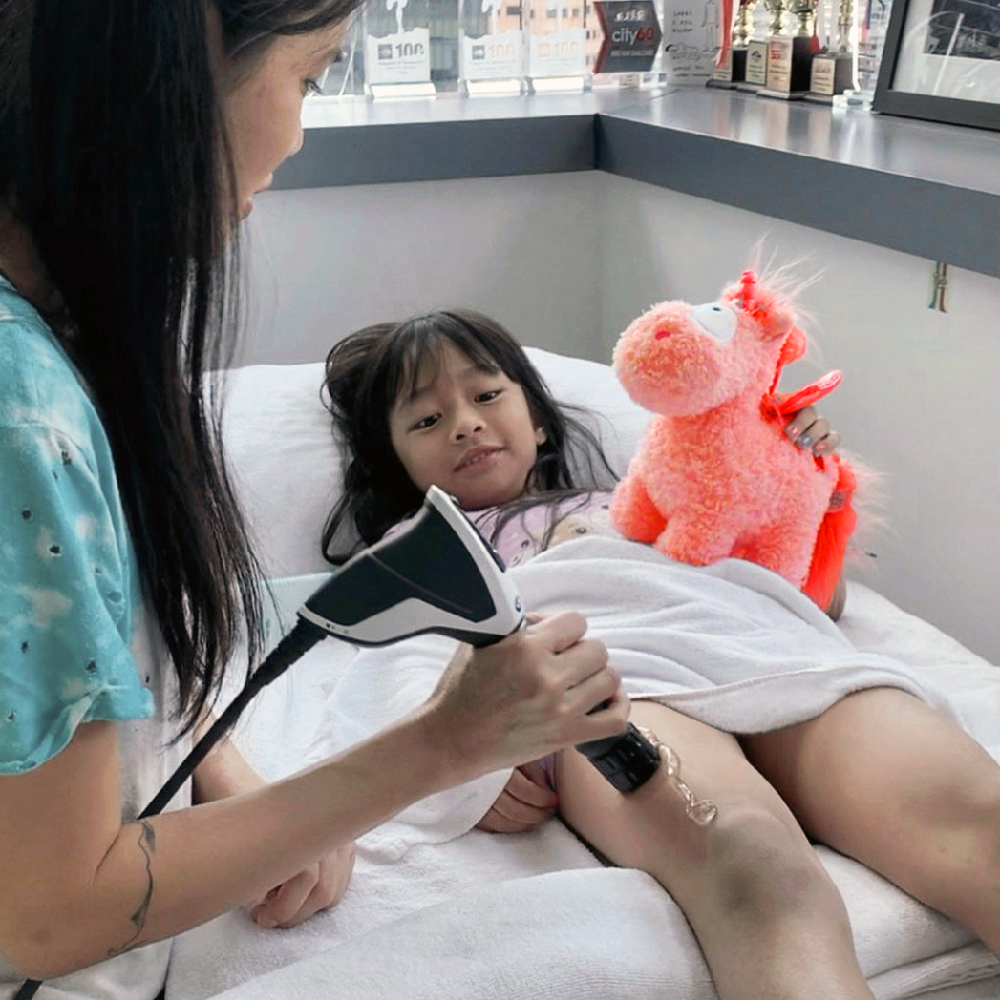
Beyond exercises, pediatric physiotherapists bring other therapeutic modalities such as ultrasound, gentle electrical stimulation, hydrotherapy, and more, always considering the child’s comfort and safety.
Children can be resilient, but they also need assurance and encouragement. Most postoperative pediatric physiotherapy revolves around creating a positive and supportive environment. This involves using age-appropriate communication, integrating play into therapy, and ensuring the child feels heard and involved in their recovery process.
As such, integral to pediatric care is the role of families; physiotherapists work to educate parents and caregivers with knowledge and tools to aid recovery at home. The ultimate goal? Preparing the child to return to daily physical and emotional activities confidently.
Consultations with Pediatric Physiotherapists Liam McGinley
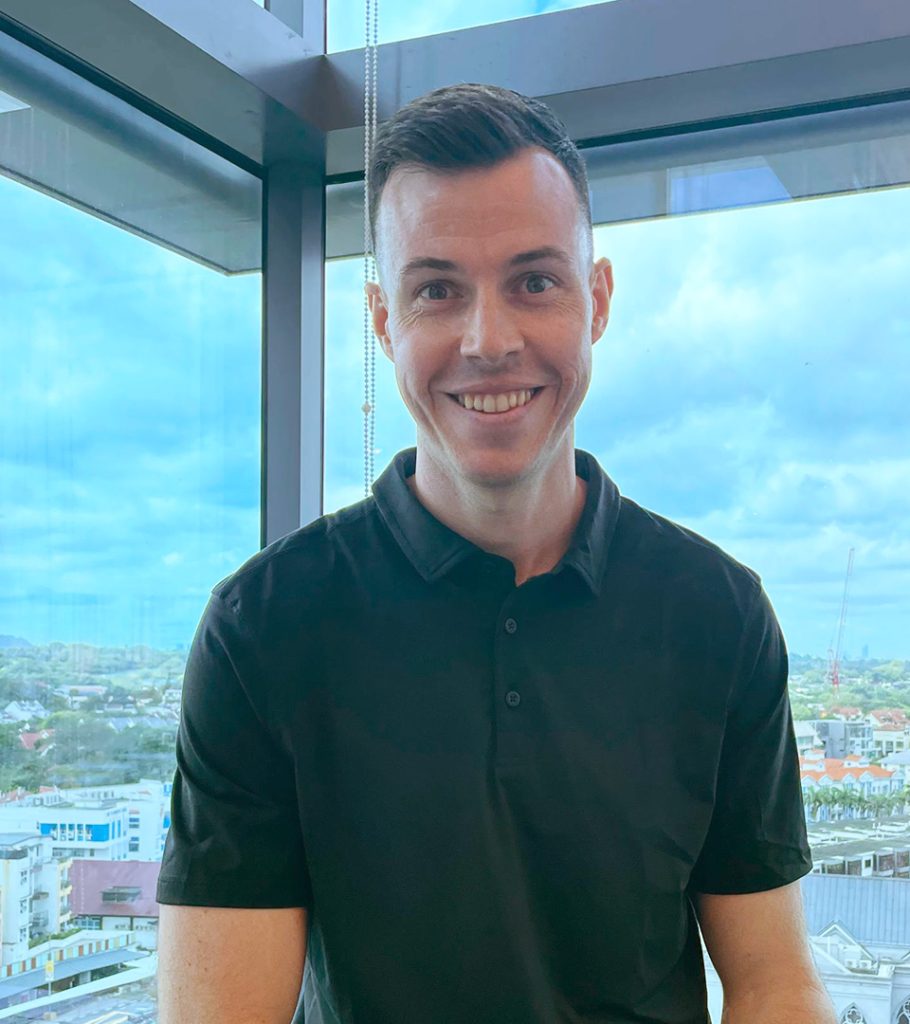
Working alongside leading pediatric practitioners and therapists, Liam McGinley collaborates within a multidisciplinary framework to recommend optimal and appropriate treatment pathways for your child. Liam has worked in pediatric physiotherapy in Singapore for several years, including at Singapore’s KK Women’s and Children’s Hospital. He is adept at identifying childhood conditions that necessitate specialist care throughout these formative years.
Please note that this is not an exhaustive list of the conditions treated at our clinic. If your child has a condition not listed above, do not hesitate to get in touch.

